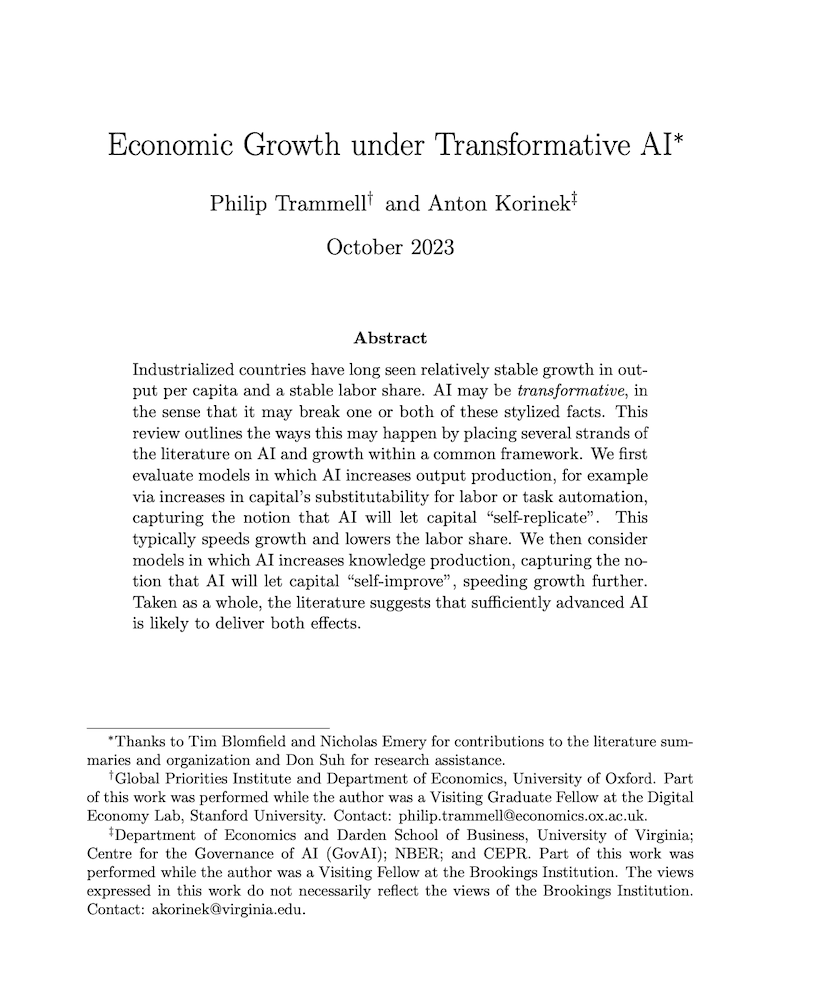Economic growth under transformative AI
Philip Trammell (Global Priorities Institute, Oxford University) and Anton Korinek (University of Virginia, NBER and CEPR)
GPI Working Paper No. 8-2020, published in the National Bureau of Economic Research Working Paper series and forthcoming in the Annual Review of Economics
Industrialized countries have long seen relatively stable growth in output per capita and a stable labor share. AI may be transformative, in the sense that it may break one or both of these stylized facts. This review outlines the ways this may happen by placing several strands of the literature on AI and growth within a common framework. We first evaluate models in which AI increases output production, for example via increases in capital's substitutability for labor or task automation, capturing the notion that AI will let capital “self-replicate”. This typically speeds up growth and lowers the labor share. We then consider models in which AI increases knowledge production, capturing the notion that AI will let capital “self-improve”, speeding growth further. Taken as a whole, the literature suggests that sufficiently advanced AI is likely to deliver both effects.
Other working papers
Dynamic public good provision under time preference heterogeneity – Philip Trammell (Global Priorities Institute and Department of Economics, University of Oxford)
I explore the implications of time preference heterogeneity for the private funding of public goods. The assumption that players use a common discount rate is knife-edge: relaxing it yields substantially different equilibria, for two reasons. First, time preference heterogeneity motivates intertemporal polarization, analogous to the polarization seen in a static public good game. In the simplest settings, more patient players spend nothing early in time and less patient players spending nothing later. Second…
Aggregating Small Risks of Serious Harms – Tomi Francis (Global Priorities Institute, University of Oxford)
According to Partial Aggregation, a serious harm can be outweighed by a large number of somewhat less serious harms, but can outweigh any number of trivial harms. In this paper, I address the question of how we should extend Partial Aggregation to cases of risk, and especially to cases involving small risks of serious harms. I argue that, contrary to the most popular versions of the ex ante and ex post views, we should sometimes prevent a small risk that a large number of people will suffer serious harms rather than prevent…
The structure of critical sets – Walter Bossert (University of Montreal), Susumu Cato (University of Tokyo) and Kohei Kamaga (Sophia University)
The purpose of this paper is to address some ambiguities and misunderstandings that appear in previous studies of population ethics. In particular, we examine the structure of intervals that are employed in assessing the value of adding people to an existing population. Our focus is on critical-band utilitarianism and critical-range utilitarianism, which are commonly-used population theories that employ intervals, and we show that some previously assumed equivalences are not true in general. The possible discrepancies can be…

